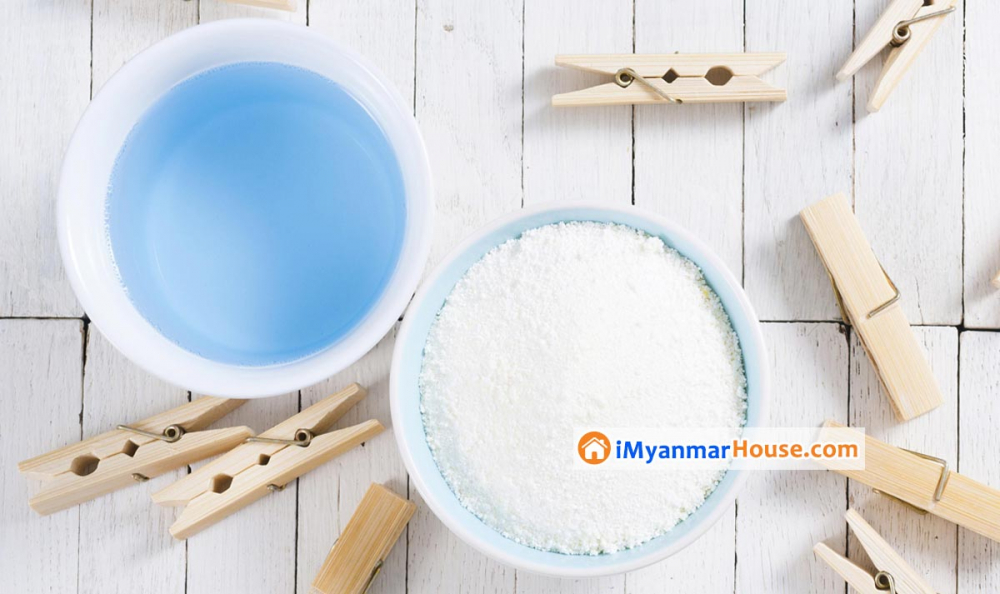
Knowledge | Posted by Si Thu Aung
Though powder detergent was the first one on the scene, liquid laundry detergent has proved far more popular in recent years. But is one truly better than the other?
Every editorial product is independently selected, though we may be compensated or receive an affiliate commission if you buy something through our links.
Doing the laundry is a chore with a lot of considerations to keep in mind. What cycle should you use? Hot or cold? Should towels be washed separately from your clothes?
If you’ve ever blindly thrown everything in your hamper into the washing machine, you’ve surely paid the price. But just as important as how you wash your clothes is what you wash them with. When it comes to powder detergent versus liquid detergent, it depends.
Powder Detergent Is Cheaper
One of the most alluring reasons to opt for powder detergent is its price tag. It costs less because it takes more chemistry to build liquid detergents, according to Shoaib Arif, manager of applications and technical service at Pilot Chemical. Plus: This product will whiten your laundry without bleach.
Powder Detergent Works Better on Outdoor Stains
The main cleaning agent in powder detergent is linear alkylbenzene sulfonate, which is highly effective on outdoor stains like mud, clay or grass. You can also follow this guide on how to remove stains.
Liquid Detergent Is Better for Greasy or Oily Stains
Most liquid detergent contains alcohol ethoxylates among its ingredients, which are effective on challenging oily stains. Did you know you can use ice cubes in your laundry? Here’s how.
Liquid Detergent Is More Convenient
Many people consider it easier to pour out a small amount of liquid soap into the washing machine than scooping out a portion of powder. If you’re not skilled at transferring the powder, it’s a pain to clean up any droppings. And powdered laundry detergent comes in a cardboard box that’s heavy, hard to carry and rips easily, especially if it gets wet.
Liquid Detergent Isn’t as Sustainable
While it can be annoying to deal with a cardboard box, they can easily be recycled. Unlike powder detergent, liquid detergent comes in a plastic bottle. Plastic can also be recycled, though many consumers and municipalities don’t participate in recycling programs. That’s why plastics are some of the least recycled containers, according to the Environmental Protection Agency (EPA).
And because liquid detergent contains a lot of water, it’s heavier to transport, resulting in more gases being emitted into the atmosphere.
Powder Detergent Has a Longer Shelf Life
Powder cleaning agents are more stable than their counterparts, retaining their cleaning power much longer. Liquid cleaning agents lose their strength when mixed with water. If you’re the type of person who likes to buy in bulk, powder detergent is the better choice.
Liquid Detergent Mixes With the Wash Water Better Powder detergent is finicky with water temperature. Some brands don’t dissolve in the cold water setting, notably in high-efficiency (HE) washers.
If you have a lot of clothes that are cold-water wash only (to avoid shrinkage and dyes from bleeding) or you’re trying to lower your electric bill, this is a big issue. If you do choose to use the cold water setting when using powder detergent, you could be in for extra laundry time, with chunks of undissolved detergent leaving residue on your clothes.
Meanwhile, liquid detergent works well in cold, warm and hot water. You’ll never shrink a beloved top or fade a pair of black pants again once you know these common laundry mistakes.
Both Can Harm Your Washing Machine
Powder can leave behind chunks of undissolved detergent that can build up in your washer’s drainage system and cause blockages. On the other hand, an analysis by Consumer Reports found liquid detergent measuring caps are rarely marked with clear lines, so it’s all too easy to use too much. It’s also difficult to determine just how much liquid you need for a small, medium or large load. That surplus of suds can lead to various problems, including prolonged rinse cycles and leaks.
Just remember: Even when laundry is filthy, smelly and stained, more detergent isn’t better. If there are suds after the rinse cycle, your clothes aren’t getting clean.
So Which Type Should You Use?
When it comes down to it, powder and liquid detergents have their pros and cons, but they each do their job of getting your clothes clean.
If you’re going to choose a liquid, go for a concentrated formula to get the best value, since liquid laundry detergent is mostly water. Mrs. Meyer’s Laundry Detergent is concentrated for 64 loads. It’s safe and gentle on clothes, contains cleaning agents from plant-derived sources and dirt and stain-fighting enzymes, and is biodegradable and HE compatible.
If you’re considering powder detergent, Tide Plus Bleach Powder is a great choice, since it’s formulated to work just as well in cold water as hot. It also brightens clothes using color-safe bleach. Plus: This trick will remove pet hair from your clothes and bedding ASAP.
Ref: liquid-vs-powder-detergent









